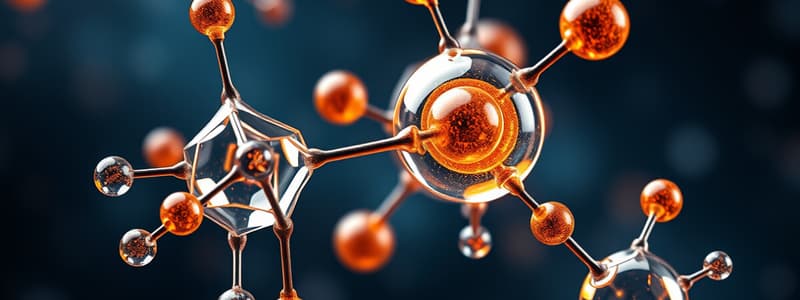Podcast
Questions and Answers
Which compound is primarily associated with the synthesis of proteins within the body?
Which compound is primarily associated with the synthesis of proteins within the body?
- Triglycerides
- Nucleotides
- Amino Acids (correct)
- Fatty Acids
What type of bond is crucial for the stability of organic compounds?
What type of bond is crucial for the stability of organic compounds?
- Ionic bonds
- Covalent bonds (correct)
- Hydrogen bonds
- Van der Waals forces
What is the primary role of enzymes in biological processes?
What is the primary role of enzymes in biological processes?
- Providing structural support
- Transporting nutrients
- Catalyzing chemical reactions (correct)
- Storage of genetic information
Which molecule is typically derived from dietary sources such as turkey?
Which molecule is typically derived from dietary sources such as turkey?
What is required in addition to substrates for the synthesis of products in enzymatic reactions?
What is required in addition to substrates for the synthesis of products in enzymatic reactions?
Which of the following describes the nature of organic compounds effectively?
Which of the following describes the nature of organic compounds effectively?
What is the significance of the amino group in organic compounds?
What is the significance of the amino group in organic compounds?
How do organic compounds typically interact with the body?
How do organic compounds typically interact with the body?
Which of the following statements correctly describes the nature of molecules?
Which of the following statements correctly describes the nature of molecules?
Which energy process is characterized by the release of energy?
Which energy process is characterized by the release of energy?
What type of metabolic process involves converting substances into simpler forms?
What type of metabolic process involves converting substances into simpler forms?
Which statement about enzyme function is true?
Which statement about enzyme function is true?
What is a common characteristic of endergonic reactions?
What is a common characteristic of endergonic reactions?
Which of the following is NOT a characteristic of an anabolic pathway?
Which of the following is NOT a characteristic of an anabolic pathway?
In the context of energy transformations during metabolic processes, which statement is accurate?
In the context of energy transformations during metabolic processes, which statement is accurate?
Which of the following best describes the role of energy in catabolic reactions?
Which of the following best describes the role of energy in catabolic reactions?
Which term describes the conversion of complex molecules into simpler ones?
Which term describes the conversion of complex molecules into simpler ones?
What characterizes an exergonic reaction in terms of energy?
What characterizes an exergonic reaction in terms of energy?
In biological processes, which type of reaction typically requires the application of energy?
In biological processes, which type of reaction typically requires the application of energy?
Which of the following accurately describes a catabolic reaction?
Which of the following accurately describes a catabolic reaction?
Which of the following is NOT a function of enzymes?
Which of the following is NOT a function of enzymes?
What distinguishes endergonic reactions from other types of reactions?
What distinguishes endergonic reactions from other types of reactions?
Which metabolic process typically involves the synthesis of complex molecules?
Which metabolic process typically involves the synthesis of complex molecules?
Which of the following processes is considered spontaneous?
Which of the following processes is considered spontaneous?
What is essential for the synthesis of products during enzymatic reactions?
What is essential for the synthesis of products during enzymatic reactions?
Which statement accurately reflects the relationship between enzyme activity and energy requirements?
Which statement accurately reflects the relationship between enzyme activity and energy requirements?
What factor most influences the stability of organic compounds?
What factor most influences the stability of organic compounds?
In which condition are compounds synthesized within the body most effectively?
In which condition are compounds synthesized within the body most effectively?
Which of the following organic compounds is involved in the formation of proteins?
Which of the following organic compounds is involved in the formation of proteins?
What role do covalent bonds play in organic chemistry?
What role do covalent bonds play in organic chemistry?
How does the body utilize amino groups from dietary sources?
How does the body utilize amino groups from dietary sources?
Flashcards are hidden until you start studying
Study Notes
Chemical Elements and Molecules
- A molecule is formed by the chemical bonding of two or more elements.
- Compounds consist of different elements bonded together; pure molecules do not qualify as compounds if they consist of the same type of element.
Energy in Chemical Reactions
- Reactions can be classified as endergonic (energy absorbed) or exergonic (energy released).
- Exergonic reactions release energy, while endergonic reactions require an input of energy to proceed.
Enzymes and Metabolic Processes
- Enzymes act as catalysts to speed up chemical reactions in metabolic processes.
- Metabolism consists of two main processes: anabolic (building complex molecules) and catabolic (breaking down molecules).
Organic Compounds
- Organic compounds typically contain carbon atoms bonded by covalent bonds.
- These compounds can be complex and flexible in structure, due to the nature of carbon bonds.
Examples of Nutrients
- Tryptophan is an amino acid found in foods such as turkey and is crucial for various biological functions.
- Amino groups play an essential role in the formation of proteins and other biological molecules.
Synthesis and Recycling in the Body
- The body synthesizes compounds through metabolic pathways and recycles materials to maintain physiological functions.
- Understanding the role of various organic compounds and molecules is vital for comprehending biological processes.
Chemical Elements and Molecules
- A molecule is formed by the chemical bonding of two or more elements.
- Compounds consist of different elements bonded together; pure molecules do not qualify as compounds if they consist of the same type of element.
Energy in Chemical Reactions
- Reactions can be classified as endergonic (energy absorbed) or exergonic (energy released).
- Exergonic reactions release energy, while endergonic reactions require an input of energy to proceed.
Enzymes and Metabolic Processes
- Enzymes act as catalysts to speed up chemical reactions in metabolic processes.
- Metabolism consists of two main processes: anabolic (building complex molecules) and catabolic (breaking down molecules).
Organic Compounds
- Organic compounds typically contain carbon atoms bonded by covalent bonds.
- These compounds can be complex and flexible in structure, due to the nature of carbon bonds.
Examples of Nutrients
- Tryptophan is an amino acid found in foods such as turkey and is crucial for various biological functions.
- Amino groups play an essential role in the formation of proteins and other biological molecules.
Synthesis and Recycling in the Body
- The body synthesizes compounds through metabolic pathways and recycles materials to maintain physiological functions.
- Understanding the role of various organic compounds and molecules is vital for comprehending biological processes.
Studying That Suits You
Use AI to generate personalized quizzes and flashcards to suit your learning preferences.




